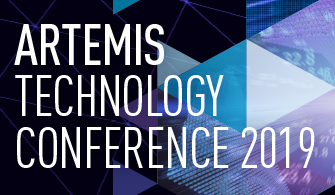- Published on 06 May 2019
- Events
ATC 2019: addressing the many revolutions
When you think of the industrial revolution, Amsterdam may not be the first city that springs to mind – but maybe it should be. Almost 500 years ago, in the time of Rembrandt, the Netherlands had just achieved the highest standard of living across the whole world. Part of this was due, of course, to advanced shipbuilding methods that opened up the port of Amsterdam to the far-flung corners of the globe. Less well-remembered, however, are the domestic innovations that took place in wind, water and peat. Canals and windmills, often underestimated today as merely the backdrop for postcards, were foundational technologies that paved the way to the more famous revolutions of the eighteenth century – not only in the Netherlands but in Great Britain and the United States, where the canal systems were emulated. You might say that Amsterdam was ahead of the curve, making it a fitting location for the ARTEMIS Technology Conference 2019.
A tradition reborn
Located at the elegant Steigenberger Airport Hotel, this year’s conference brought together more than 30 speakers from a diverse range of organisations within the ARTEMIS community. As the first of its kind in three years, this conference also provided dozens of opportunities to assess the ever-changing state of affairs, to reunite old colleagues and to make new connections. While ARTEMIS has seen a great deal of success in the last 15 years of operation, new challenges are constantly emerging for our 200 members, European society and the world as a whole. How can we unlock the full potential of Embedded Intelligence and retain our leadership in key areas of the value chain? How do we reach Level 5 automated driving without taking undue safety risks? Does a hybrid approach to systems health hold the key to the next stage of predictive maintenance? These are the sorts of questions that were grappled with in Amsterdam from April 16 to 17.
The community spirit
Jean-Luc di Paola-Galloni, President of ARTEMIS-IA, kicked off the proceedings with warm words. “We are a community, and it’s very important that the community meets on a regular basis, that we share the topics at stake. It’s a good tradition.” As in many of the conference’s talks, the idea of being on the cusp of a transformation looms large. “We are living in very interesting, transitional, if not revolutionary times,” Jean-Luc continues. “Our digital thinking on this continent is being challenged. We need to be open and accept those challenges. On the other hand, some of those challenges appear as clear threats. Whether we belong to laboratories, SMEs, start-ups or larger groups, we have to take certain responsibilities. We need to be outcome-oriented, intelligence deliverable-oriented, so that we can protect what we can nurture in the future and play our role in a globalised world while sending a clear message when sovereignty is at stake.”
Covering all angles
In this issue of the ARTEMIS Magazine, we speak to just some of the many distinguished guests who attended this year’s conference. From the automotive world, Lucie Beaumel shares the technological challenges faced by EGVIA, while Martin Törngren uses automated driving as a jump-off point to analyse Cyber-Physical Systems today. Digital twinning plays a role in both Jeroen Voeten’s look at timing bottlenecks in component-based software and Michael Paulweber’s unveiling of ENABLE-S3’s validation results. Elena Tsiporkova and Stefan Poledna examine, respectively, data-driven system health monitoring and the convergence of IT and OT. With the project now two-thirds of the way through, four representatives from AutoDrive give a comprehensive overview of their journey so far. Klaus Beetz of Siemens, meanwhile, gives the rundown on how digitalisation revolutionises the production chain. Finally, the conference saw the release of Embedded Intelligence: Trends and Challenges, a study by Advancy which is discussed by Jan Lohstroh and Saad Khaled. This detailed report sets a path for Europe in which leadership in key domains can be retained and strengthened. In the words of Jean-Luc, “the ARTEMIS community represents the biggest chunk of what will be the future of the value of digital. Any future programme should be readdressed and rebalanced to take this into account.”


